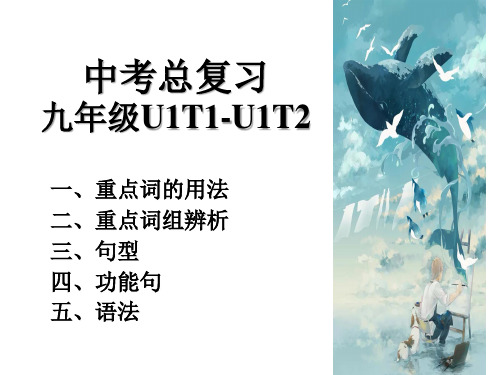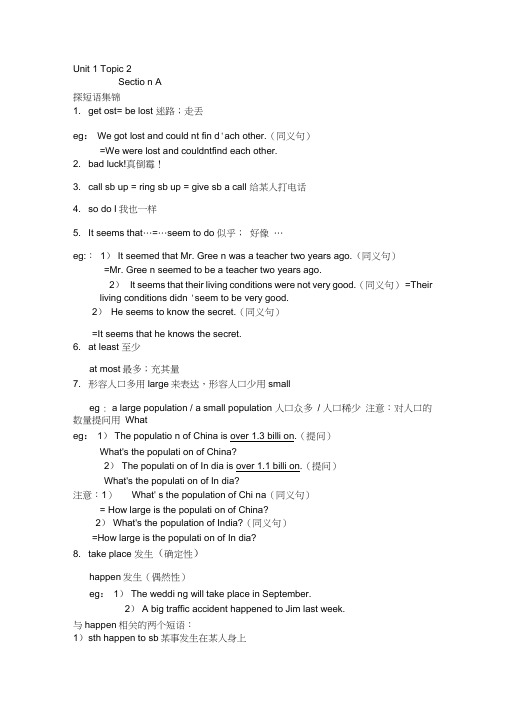仁爱版九年级上册1-2复习
- 格式:ppt
- 大小:273.00 KB
- 文档页数:28

仁爱英语九年级上册Unit1—Unit2主要学问点归纳【教材回来考点过关】1. have been to 表“曾经去过某地”。
留意区分:have gone to表“已经去某地了”。
如:I have been to Shanghai. (去过上海,已经回来)He has gone to Shanghai. (去上海了,不在此处)2. have (no) time to do sth做某事(没)有时间Tom is busy helping his mother with housework, he has no time to play with you. 汤姆忙于扶植妈妈做家务,他没有时间与你玩3. What’s the population of…? 对人口提问的方式= how large is the population of…What’s the population of China? 中国的人口是多少?How large ix the population of China?注:人口不能用many/much 修饰,但是How many people 对多少人提问这样是可以的。
How many people are there in China?= What’s the population of China?4. What do you mean by sth.? 某物是什么意思呢?= What’s the meaning of sth.?= What does sth. mean?What do you mean by the word? 这个单词是什么意思?= What’s the meaning of the word?= What does the word mean?5. — How long have you been likethis? 你处于这样的状态多久了?—I have been like this since last month. 自从上个月以来我始终这样。


仁爱英语九年级上册U1T1-2要点Unit1Topic11.Our country has developed rapidly.develop—n. 发达的:发展中的:rapid—adj.2.Rita, you have just come back from your hometown.现在完成时态标志性词汇:3.Great changes have taken place there and my hometown has become more and morebeautiful.take—(过去式)(过去分词)take place 发生越来越胖越来越重要越来越热越来越困难4.But there were so many people that I couldn’t find a proper place to take photos.5.I have been to an English summer school to improve my English.6.By the way, where’s Maria?----She has gone to Cuba to be a volunteer…..have been to/have gone to/have been in 的区别7.There goes the bell.8.You have taken part in some volunteer activities during the summer holidays, haven’t you?take part in和join的区别复习反意疑问句9.Have you ever fed them?ever“曾经”,多用于疑问句。
never “从不”,多用于否定陈述句。
常用来回答ever的句型。
Has he ever been abroad?----No, never.before “之前”,一般位于句末,常与never 呼应。


Unit 1 Topic 2Sectio n A探短语集锦1. get ost= be lost 迷路;走丢eg: We got lost and could nt fin d'ach other.(同义句)=We were lost and couldntfind each other.2. bad luck!真倒霉!3. call sb up = ring sb up = give sb a call 给某人打电话4. so do I我也一样5. It seems that…=…seem to do 似乎;好像…eg::1) It seemed that Mr. Gree n was a teacher two years ago.(同义句)=Mr. Gree n seemed to be a teacher two years ago.2)It seems that their living conditions were not very good.(同义句)=Their living conditions didn 'seem to be very good.2)He seems to know the secret.(同义句)=It seems that he knows the secret.6. at least 至少at most最多;充其量7. 形容人口多用large来表达,形容人口少用smalleg : a large population / a small population 人口众多/ 人口稀少注意:对人口的数量提问用Whateg: 1) The populatio n of China is over 1.3 billi on.(提问)What's the populati on of China?2) The populati on of In dia is over 1.1 billi on.(提问)What's the populati on of In dia?注意:1)What' s the population of Chi na(同义句)= How large is the populati on of China?2) What's the population of India?(同义句)=How large is the populati on of In dia?8. take place 发生(确定性)happen发生(偶然性)eg: 1) The weddi ng will take place in September.2) A big traffic accident happened to Jim last week.与happen相关的两个短语:1)s th happen to sb某事发生在某人身上2)h appen to sth碰巧做某事eg: 1) A fire accide nt happe ned to Kang Kang last ni ght.1) Lily happe ned to meet her En glish teacher in the park last Sun day.9. because of…由于;因为10. one-child policy:独生子女政策11. used to do sth过去常常做某事be used to doing sth = get used to doing sth 习惯于做某事used to be 过去曾经是There used to be过去曾经有eg: 1) My brother used to play soccer after school.2) Mr. Gree n is used to smok ing.=Mr. Gree n gets used to smok ing.3) Miss Yang used to be a teacher.4) There used to be a bridge in front of my house.5) Lily used ______ (play) basketball in the gym.6) My sister is used to _______ (speak) English.12. in developing countries:在发展中国家In developed coun tries 在发达国家13. 在比较级中,如果比较对象相同,用that代替前面的单数;用those代替前面的复数eg: 1) The weather in Beijing is colder than ________ in Chongqing.2) The population of China is larger than _______ of India.3) The apples on the tree are redder than ______ in the basket.14. too many +可数名词复数too much +不可数名词much too + 形容词many too + 形容词eg: 1) There are too many people in the park on Sun days.2) I don 'like eat ing too much can dy.Sectio n B1. increase by 增加了….in crease to增加到了…eg: 1) Our pay has in creased by¥ 200.2) Our pay has in creased to¥ 2800.2. carry out:执行eg: 1) The policema n carried out a task just now.2) China has carried out the one-child policy to control the population.3.1) so + be助动词/情态动词+另一主语:表示前面提到的肯定情况同样适合另一主语,意为某人也如此eg::a. Jane likes Chinese , _______________________ (莉莉也如此).b. She has bee n to Shan ghai _, _______________________________ (她的弟弟也如此).2)Neither + be/情态动词/助动词+另一主语):表示前面提到过的否定情况同样适合另一主语,意为某人也不....eg: a. No one likes little emperors", ___________________ __________ .(我的父母亲也不喜欢)b. Lily didn 'go to school yesterday, __________________________ .(Jane也没去上学)c. He isn 'a teacher, _______________________ .(我也不是)3)so /neither +同一主语+ be /情态动词/助动词:表示对前面的话的确认,意为的确如此/的确不是这样eg: a. Lily likes English, _______ ___________________(的确如此).b. Li Ming doesn'study hard, ___________________________ .(的确是这样)特别提醒:1)Me, neither. = Neither +助动词/be动词/情态动词+ I2)Me, too. = so + 助动词/be动词/情态动词+ I Sectio n C1. carry out:执行;实行2. more tha n = over 超过;多余3. Live in +地点:居住在某地4. China has the largest population in the world.(同义句)=China has a larger populati on tha n any other country in the world.5. because o f 由于6. be short o:短缺…;缺乏…7. so far:到目前为止;迄今为止8. take many measures :采取措施take measures to do sth 采取措施做某事eg: 1) We should take measures __________ (protect) the environment.2) The government will take many measures ___________ (control) the populatio n.9. work well in doing sth :在…方面起作用eg: It works well in _________ (protect) our teeth.10. be known as = be famous a s 作为…而出名be known for = be famous fo:因…而出名11. have a long way to go:有一条长长的路要走12. face / solve / deal with a problem 面对/ 解决/ 处理问题Sectio n D1. less than 少于;不到与more than是一对反义词组注意:more than = over2. a couple of hours / days 几个小时/天3. unless:连词意为除非在句中引导条件状语从句.可改为if -n-oteg: 1) I won tgo to Lily ' birthday party unless I am invited. 同义句)=I won 'go to the Lily ' birthday party if I am not in vited.2) They won 'go climbi ng unl ess it is fine tomorrow.(同义句)=They won 'go climbi ng if it isn 'fi ne tomorrow.4. far away 遥远5. places of interest 名胜古迹6. keep up with = catch up with 跟上;赶上探精讲精析分数的表达分子用基数词,分母用序数词,先说分子,再说分母,分子大于1,分母要加s eg:三分之二:two thirds五分之三:three fifths二分之一:one sec ond八分之五:five eighths注意:谓语的数由分数所指的名词决定,即分数后的名词如果是复数,谓语的数就用复数,如果是不可数名词或单数名词,谓语的数就用三单形式eg 1) One third of the students _______ to go.2) Two thirds of the teachers ________ (be) men.3) One fifth of the bread ________ (go) bad.4) A quarter of the students ______ (be) girls5) Sixty perce nt of her in come (收入) ___________________ on clothes.探语法聚焦现在完成时常与下列副词(just / already / yet / ever / never /before连用just:意为刚刚置于助动词have / has之后,实义动词之前already:意为已经用于肯定句可置于句中have / has之后,也可置于句末. yet:用于否定句表示还没,尚未),用于一般疑问句时意为已经ever:意为曾经多用于一般疑问句never:意为从来不多用于陈述句表否定before:意为在以前一般置于句末用just / already / yet / ever / never /before填空A1) She knows nothing about the book because she has ___ read it.2) The early bus has _____ left. You have to wait for the next.3) ________________ _ Have they gone fishing?_ No,4) Have they finished their work _____ ?5) Has Mary ______ been to China?6) I've been there _______ and don'want to go there any more.BA: Have you ______ been to France?B: No, I "ve _______ been to any European countries, but Michael has. He says he has _______ been to such a beautiful country before.A: Have you see him ______ ?B: Yes, I have see him ________。

仁爱版九年级 Unit 1 topic2 Topic2 A部分课文要点如下:ever,never,already,yet 用法1、ever曾经 :用在疑问句和否定句中Have you ever been to Jilin University? 曾经去过吉林大学 吗?2、never:从不No,I have never been to Jilin University. 从没去过吉林大学3、already 已经: 用在肯定句But I have already been to Tsinghua University. 去过清华大学4、yet 已经,还,然而:用在疑问句和否定句中I haven't been to Peking University yet.还没去过北京大学I have never been to Peking University.从没去过1、popular流行的 ---un popular---popular ity流行度be popular with 受某些人的欢迎2、populate聚居---population---人口3、(1)购物中心-----shopping center(2)百货商场-----department store(3)中心公园-----central park(4)center中心-----central 中心的(5)世纪公园-----Century Park(6)天安门广场----Tian'anmen Square(7)时代广场-----Times Square(8)莫斯科红场------Red Square4、我以前从未去过那儿,但我再也不想去那儿了I have never been there before,but I don't want to go there any more.not...any more 不再...not ..any longer 时间上不再继续 例:He couldn't wait any longer. 5、走失,迷路-----get lost我们走散了,找不到对方-----We got lost and couldn't find each other.我的钢笔丢了----My pen is lost=My pen is gone=My pen is mising.6、给...打电话------call sb up =ring sb up = make a phone call to sbI often call my mother up on weekends.7、倒装句:so+be+主语, 表示“....也一样”neither+be+主语, 表示“....也不”<1>He really hate going to a place like that.So ___ ___.他真的讨厌去那样的地方,我也是。
仁爱英语九年级上册Unit1-topic2知识点总结仁爱英语九年级上册知识点归纳Unit 1 The Changing WorldTopic2 The population in developingcountries is growing faster.一、重点短语1.get/be lost 迷路2.bad luck 真倒霉3.call/ring/phone sb. (up)=give sb. a call/ring=make a phone call to sb.给某人打电话4.not…any longer=no longer不再(时间)not…any more=no more不再(次数)5.on the phone 通过电话6.in the newspaper在报纸上7.a/the population of………的人口8.increase by 增加了 increase to 增加到9.developing countries 发展中国家 developed countries 发达国家10.carry out 执行,实施11.the one-child policy 独生子女政策12.one fifth 五分之一13.because of 因为,由于 thanks to sb./sth.幸亏,由于(具有感情色彩)14.satisfy people’s daily needs满足人们的日常需求15.so far 到目前为止(和现在完成时连用)16.take measures to do sth.采取措施做某事17.work well in doing sth. 在做某事方面卓有成效18.fewer than 少于,不到(修饰可数名词) less than 少于,不到(修饰不可数名词)19.be surrounded by…被……包围20.close to…接近于/在……附近21.discourage doing sth. 阻止做某事22.first of all 首先23.belong to 属于24.offer sb.sth.=offer sth. to sb.给某人提供某物二、单词转换1.luck n.幸运 lucky adj. 幸运的 luckily adv. 幸运地2.Russian. 俄罗斯 Russian n. 俄国人,俄语 adj.俄国的,俄国人的,俄语的3.social adj.社会的,社交的 society n.社会4.nature n.自然 natural adj. 自然的5.develop v. 发展 developed adj. 发达的developing adj. 发展中的 development n. 发展三、重点句型1.I have just called you.我刚刚给你打过电话。
Unit 1 Topic 1I.重点词组1.take photos 照相2.learn…from…向……学习3.in detail 详细地4.in order to为了5.give support to…为……提供帮助6.se.sth.onesel.亲眼所见某物7.keep in touch with 与……保持联系8.sorts of各种各样的9.make progress 取得进步10.draw up 起草,拟定11.thanks to 由于II.重点句型1.I.on.plac..sa.childre.workin.fo..crue.boss.在一处我看到了孩子们为残忍的老板干活。
2..fel.sorr.fo.them.我对他们深表同情。
3.Wher.hav.yo.been.Jane.你去过哪里, 简?4.Sh.ha.gon.t.Cub.t.b..volunteer.她去古巴当志愿者了。
5.Ther.goe.th.bell.铃响了。
6.Thoug..ha.n.tim.t.travel..stil.fel.ver.happy.虽然我没有时间去旅行,但是我仍然感到很开心。
7.No.ou.countr.ha.develope.rapidly.现在我们国家发展迅速。
III.语法1.现在完成时态的构成: 助动词have/has+动词的过去分词.bac.fro.you.hometown.2.现在完成时态的句式:e.g.(1..hav.bee.t.Moun.Huan.wit.m.parents.(2) I haven’t seen him for a long time.(3) Where have you been?(4.——Hav.yo.eve.cleane..room?.——Yes..have..No..haven’t.3.have.ha.been.have/ha.gon.的区别have/has been to sp.表示曾经到过某地—— have/has gone to sp.表示已经去了某地e.g.(1..hav.bee.t.Moun.Huan.wit.m.parents. .(2.Sh.ha.gon.t.Cub.t.b..vo lunteer.Unit 1 Topic 2I.重点词组1. get lost 迷路2. each other 彼此3.at least 至少4take place发生5because of 因为6.b.stric.wit.sb.对某人严格要求.7.carry out 实行8.be short of 缺乏9.take measures to do sth.采取措施做某事10.be known as…作为……而著名11.work well in doing…在……方面起作用12.a couple of 一些13keep up with赶上,跟上II.重点句型1.Hav.yo.foun.hi.yet.你已经找到他了吗?2.——.reall.hat.t.g.shopping.我的确讨厌购物。
仁爱版英语九年级上册考点(unit 1-unit 2)【教材回归 考点过关】1.have/has been to 表“曾经去过某地”(去而复返)区别:have/has gone to 表“已经去某地了”如: I have been to Shanghai.(去过上海,已经回来)He has gone to Shanghai.(去上海了,不在此处)2.have (no) time to do sth 做某事(没)有时间Tom is busy helping his mother with housework, he has no time to play with you. 汤姆忙于帮助妈妈做家务,他没有时间和你玩3.What’s the population of...? 对人口提问=How large is the population of ...What’s the population of China? 中国的人口是多少?How large is the population of China?注:人口不能用many/much 修饰,但是how many people 对多少人提问这样是可以的。
How many people are there in China?=What’s the population of China? 4.What do you mean by sth.?某物是什么意思呢?= What’s the meaning of sth.? = What does sth.mean?如:What do you mean by the word? 这个单词是什么意思?= What’s the meaning of the word?= What does the word mean?5.----How long have you been like this? 你处于这样的状态多久了?---- I have been like this since last month.自从上个月以来我一直这样。
九年级上册英语书仁爱版笔记仁爱版九年级上册英语书笔记。
一、Unit 1 The Developing World。
(一)重点单词。
1. proper.- adj. 恰当的,合适的;正确的。
例如:You should use proper language in public.(在公共场合你应该使用恰当的语言。
)2. by the way.- 顺便说一下。
常用来引出一个新的话题。
例如:By the way, have you seen Tom lately?(顺便问一下,你最近见过汤姆吗?)3. volunteer.- n. 志愿者;v. 自愿做。
例如:Many volunteers helped the old people in the nursing home.(许多志愿者帮助养老院里的老人。
)She volunteered to clean the classroom.(她自愿打扫教室。
)(二)重点短语。
1. have a good time.- 玩得高兴,过得愉快。
相当于enjoy oneself或have fun。
例如:We had a good time at the party last night.(昨晚我们在聚会上玩得很开心。
)2. give a report.- 作报告。
例如:The scientist will give a report on environmental protection tomorrow.(这位科学家明天将作一个关于环境保护的报告。
)(三)重点句型。
1. You have just come back from your hometown.(你刚从你的家乡回来。
)- 这是一个现在完成时的句子,表示过去发生的动作对现在造成的影响。
其结构为“have/has+过去分词”,come的过去分词是come。
2. Great changes have taken place there.(那里发生了巨大的变化。